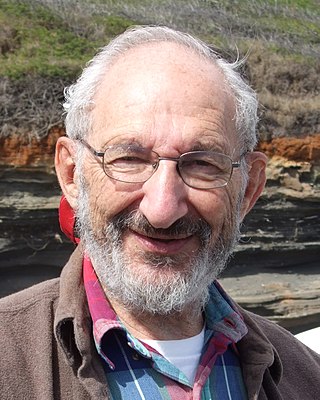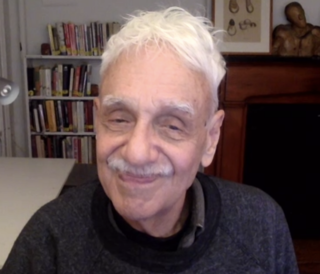
Sexology is the scientific study of human sexuality, including human sexual interests, behaviors, and functions. The term sexology does not generally refer to the non-scientific study of sexuality, such as social criticism.
Transvestism is the practice of dressing in a manner traditionally or stereotypically associated with a different gender.

Magnus T. Hirschfeld was a Jewish German physician and sexologist, whose citizenship was later revoked by the Nazi government. Hirschfeld was educated in philosophy, philology and medicine. An outspoken advocate for sexual minorities, Hirschfeld founded the Scientific-Humanitarian Committee and World League for Sexual Reform. He based his practice in Berlin-Charlottenburg during the Weimar period. Performance Studies and Rhetoric Professor Dustin Goltz characterized the committee as having carried out "the first advocacy for homosexual and transgender rights".

Milton Diamond was an American professor of anatomy and reproductive biology at the University of Hawaiʻi at Mānoa. After a career in the study of human sexuality, Diamond retired from the university in December 2009 but continued with his research and writing until retiring fully in 2018. He died on March 20, 2024, at the age of 90.
Rolf Gindorf was a German sexologist. He was a member of Mensa. In 1971 he founded the German Society for Social-Scientific Sexuality Research.

The Institut für Sexualwissenschaft was an early private sexology research institute in Germany from 1919 to 1933. The name is variously translated as Institute for Sexual Research, Institute of Sexology, Institute for Sexology, or Institute for the Science of Sexuality. The Institute was a non-profit foundation situated in Tiergarten, Berlin. It was the first sexology research center in the world.
The connection between left-leaning ideologies and LGBT rights struggles has a long and mixed history. The status of LGBT people in socialist states have varied throughout history.

Jonathan Ned Katz is an American author of human sexuality who has focused on same-sex attraction and changes in the social organization of sexuality over time. His works focus on the idea, rooted in social constructionism, that the categories with which society describes and defines human sexuality are historically and culturally specific, along with the social organization of sexual activity, desire, relationships, and sexual identities.

Manfred Bruns was a federal prosecutor at the Federal Court of Justice of Germany, and a famous German gay civil rights activist. He was until 2016 a member of the Board of Directors of the Lesbian and Gay Association (LSVD), today LSVD⁺ – Federation Queer Diversity.

The Scientific-Humanitarian Committee was founded by Magnus Hirschfeld in Berlin in May 1897, to campaign for social recognition of lesbian, gay, bisexual and transgender people, and against their legal persecution. It was the first LGBT rights organization in history. The motto of the organization was "Per scientiam ad justitiam", and the committee included representatives from various professions. The committee's membership peaked at about 700 people. In 1929, Kurt Hiller took over as chairman of the group from Hirschfeld. At its peak, the WhK had branches in approximately 25 cities in Germany, Austria and the Netherlands.
Albert Moll was a neurologist, psychologist, sexologist, and ethicist. Alongside Iwan Bloch and Magnus Hirschfeld, he is considered the founder of medical psychology and sexology. Although Moll was a pioneer of sexology, his contemporaries such as Magnus Hirschfeld and Sigmund Freud eclipsed his work, primarily due to the bitter rivalry between them. Moll accused Freud of selection bias, and Freud claimed Moll could not handle constructive criticism after their first meeting.
The German Society for Social-Scientific Sexuality Research is a sexuality research and counselling organization based in Düsseldorf, Germany. It is primarily devoted to sociological, behavioral, and cultural sexuality research.

Erwin J. Haeberle was a German social scientist and sexologist.
Robert Thomas "Bob" Francoeur Ph.D., A.C.S. was an American biologist and sexologist.
William Granzig was an American sexologist.
John H. Gagnon was a pioneering sociologist of human sexuality who wrote and edited 15 books and over 100 articles. He collaborated with William Simon to develop the piece he is perhaps best recognized for: "Sexual Conduct: The Social Sources of Human Sexuality" (1973). He was Distinguished Emeritus Professor of Sociology at the State University of New York at Stony Brook, where he taught and from 1968 to 1998. In that same time frame, he also dedicated himself to advancing the field of sociology through his research.

Ira Leonard Reiss was an American sociologist with primary interests in studying the way society impacts sexual attitudes and behaviors and how people respond to those pressures. He also had interests in the study of gender and family, particularly as they relate to sexuality. He attended Syracuse University for his B.S. degree and the Pennsylvania State University for his M. A. and Ph. D. degrees. His major area in graduate school was sociology and his minor areas were cultural anthropology and philosophy. His doctoral course work in sociology and philosophy was done at Columbia University and his French and German language study was taken at Yale University.
The International Joseph A. Schumpeter Society (ISS) is an economics association aimed at furthering research in the spirit of Joseph Schumpeter. Wolfgang F. Stolper and Horst Hanusch initiated the foundation of the society in 1986.
Martin S. Weinberg is an American sociologist whose work frequently involves human sexuality. His major areas of interest include sociology of the body, sociology of deviance and control, and interpretive sociology.










